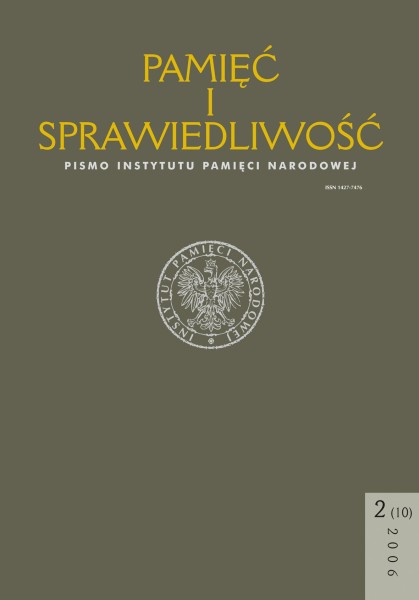Jakim państwem była PRL w latach 1956–1976?
Pamięć i Sprawiedliwość, Том 10 № 2 (2006), pages: 11-23
Publication date: 2006-12-30
Аннотация
The article is chronologically set against the dramatic events of the modern history of Poland. It begins with the political breakthrough of October 1956, marking the end of Stalinism in Poland, represented by the return to power of Władysław Gomułka, and culminates in the workers protests of June 1976 brought about by price increases. As a result of the protests, an opposition movement was established. Although not considered legal by the authorities, it was organized in nature and openly active. This period of Polish history remains insuffi ciently investigated despite undoubted progress in research. Is it
justifi ed to distinguish the 1956–1976 period and, if so, what would be its specific features?
Historians widely agree that a majority of classically totalitarian characteristics were apparent in Poland during the Stalinist period (1944–1956). The system which followed should be described more precisely as being an authoritarian regime, even though the
intention until 1989 was to create a truly totalitarian state in Poland. This is confi rmed by the scale and nature of the invigilation of society.
The importance of the breakthrough of 1956 has been discussed on more than one occasion. The communist system which had been gaining strength up to that date began to weaken, with some analysts believing that this was the beginning of its 30-year long
torment. The scale of the events of October 1956 may be viewed through the changes seen (the spontaneous de-collectivization of agriculture, the signifi cant improvement in Church - State relations, the reduction of terror in public life, greater engagement with the outside world, and increased independence in Soviet policy), as well as through what remained unchanged (the legal system, the constitution, the economy). The fact is, however, that
Poland did not cease to be a police state under dictatorial rule.
The above may also be said to be true of the period after December 1970, when Edward Gierek replaced Władysław Gomułka as the 1st Secretary of the KC PZPR (Central Committee of the Polish United Workers’ Party). Again, the system did not
undergo signifi cant change, although the improvements (as seen by society) continued, to some extent, both after 1956 and 1970. The political changes were accompanied by economic enlivenment and an improvement in the quality of life.
Наиболее читаемые статьи этого автора (авторов)
- Grzegorz Waligóra, Andrzej Friszke, Jerzy Eisler, Konrad Rokicki, Łukasz Kamiński, Grzegorz Waligóra, [Dyskusja] Między Październikiem a Czerwcem. PRL 1956–1976 , Pamięć i Sprawiedliwość: Том 19 № 1 (2012)
- Antoni Dudek, Jerzy Eisler, Andrzej Friszke, Henryk Głębocki, Łukasz Kamiński, Grzegorz Waligóra, [Dyskusja] Opozycja demokratyczna w działaniach władz PRL , Pamięć i Sprawiedliwość: Том 4 № 2 (2003)
- Joanna Sadowska, Jerzy Eisler, Łukasz Kamiński, Marek Wierzbicki, Młodzież w PRL. Dyskusja , Pamięć i Sprawiedliwość: Том 17 № 1 (2011)
- Jerzy Eisler, Andrzej Friszke, Paweł Machcewicz, Andrzej Paczkowski, Janusz Wrona, [Dyskusja] PKWN – próba oceny , Pamięć i Sprawiedliwość: Том 8 № 2 (2005)
- Jerzy Eisler, [Recenzja] Janusz Rolicki, Edward Gierek. Życie i narodziny legendy, Wydawnictwo „Iskry”, Warszawa 2002, ss. 369 , Pamięć i Sprawiedliwość: Том 2 № 2 (2002)
- Błażej Brzostek, Jerzy Eisler, Dariusz Stola, Grzegorz Waligóra, Wpływ PZPR na zachowania społeczne , Pamięć i Sprawiedliwość: Том 27 № 1 (2016)
- Jerzy Eisler, [Recenzja] Stosunki Kościół–państwo w powojennej Polsce w najnowszych publikacjach , Pamięć i Sprawiedliwość: Том 5 № 1 (2004)
- Jan Rowiński, Tytus Jaskułowski, Jerzy Eisler, [Recenzja] Polski Październik 1956 w polityce światowej, red. nauk. Jan Rowiński przy współpracy Tytusa Jaskułowskiego, Polski Instytut Spraw Międzynarodowych, Warszawa 2006, ss. 351 , Pamięć i Sprawiedliwość: Том 11 № 1 (2007)
- Jerzy Eisler, Andrzej Friszke, [Recenzja] Andrzej Friszke, Polska. Losy Państwa i Narodu 1939–1989, Wydawnictwo ISKRY, Warszawa 2003, ss. 517 , Pamięć i Sprawiedliwość: Том 4 № 2 (2003)
- Dorota Skotarczak, Jerzy Eisler, [Recenzja] Dorota Skotarczak, Obraz społeczeństwa PRL w komedii filmowej, Wydawnictwo Naukowe UAM, Poznań 2004, ss. 357 , Pamięć i Sprawiedliwość: Том 6 № 2 (2004)
 Język Polski
Język Polski
 English
English
 Deutsch
Deutsch
 Français (France)
Français (France)
 Italiano
Italiano
 Русский
Русский


 PDF (Język Polski)
PDF (Język Polski)
